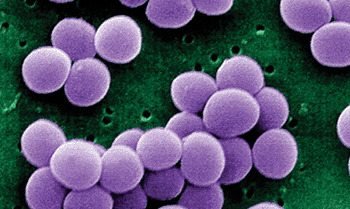Cardiac Valve Pathogens Detected by Multiplex Assay
By LabMedica International staff writers
Posted on 14 Jan 2014
Infective endocarditis (IE) is a life-threatening condition burdened by high mortality, and gram-positive cocci account for the majority of the cases. Posted on 14 Jan 2014
Blood culture represents a cornerstone for the microbiological diagnosis of IE, but it can be negative in a substantial number of patients. Similarly, culture of excised cardiac valves can be burdened by a considerable number of false negative results, mostly in patients under antibiotic therapy, or by false positive results, due to contamination.

Image: Scanning electron micrograph of coagulase-negative Staphylococcus aureus bacteria (Photo courtesy of Janice Haney Carr).
Microbiologists at the University of Perugia (Italy) carried out a proof of concept study using a commercially available multiplex real-time polymerase chain reaction (PCR) for the detection of pathogens in cardiac valves from patients with infective endocarditis. Between June 2011 and January 2013, 20 cardiac valves, 11 mitral and 9 aortic excised from an equal number of patients with definite IE diagnosis of known etiology were tested by conventional culture and the real-time PCR test. Five aortic valves excised from non-IE patients, affected by noninfective cardiac complications, were included in the study as controls. Mean age of the patients was 64.2 years and all patients were on antimicrobial therapy during sampling.
All excised valves were examined with Gram stain and inoculated into culture media. The commercially available SeptiFast real-time-PCR system (Roche Molecular Systems; Mannheim, Germany) was evaluated as a diagnostic tool for IE and was performed in Roche Diagnostics’ LightCycler instrument. An organism detected by SeptiFast (SF) test was considered true pathogen if it coincided with the infectious agent previously isolated from blood culture, collected from the same IE patient.
The SeptiFast test gave a positive result in 19 out of 20 valves from patients with IE, and a negative result in all the five valves from non-IE patients. In all cases, the organism detected by the test was concordant with the known etiologic agent and Gram staining. Culture was positive in 3 out of 20 valves from IE patients, for microorganisms matching those previously isolated from blood culture and was negative in all valves from non-IE patients, and therefore culture sensitivity was only 15.8%, and specificity was 100%. Gram staining was positive in 16 valves from IE patients, and negative in all non-IE patients.
The authors concluded that the SeptiFast (SF) assay can be used on culture-negative heart valve tissues, excised from patients with IE, showing sensitivity and negative predicative value (NPV) higher than culture, with the same high specificity and positive predictive value (PPV). In cases of SF positive for coagulase-negative staphylococci (CoNS) or streptococci, a DNA sequencing of the amplicons would be required to identify the pathogen at the species level. In case of negative SF result, it would be advisable to test cardiac valves by PCR procedures specific for uncommon infectious agents of IE. The study was published on December 21, 2013, in the journal Diagnostic Microbiology and Infectious Disease.
Related Links:
University of Perugia
Roche Molecular Systems













